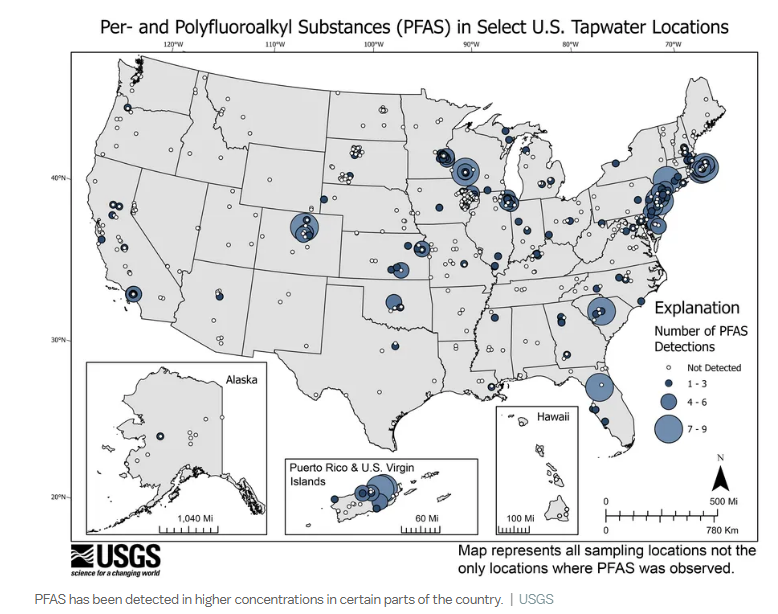Commentary
Forever chemical cleanup challenge
August 17, 2023

In June this year, 3M was ordered to pay $10.3 billion for its contamination of US drinking water supplies with per- and polyfluoroalkyl substances (PFAS), also known as forever chemicals. In the US alone, there are currently over 15,000 open claims against PFAS manufacturers and users, with some experts estimating that payouts could exceed the $200 billion payout levels of tobacco companies in the 1990s.
PFAS were invented in the 1930s and started to be widely adopted in the 1940s. These chemicals have been used in many industries for various applications since. In response to growing concerns about their side effects in humans, such as liver damage, obesity, fertility issues and cancer, many authorities around the world are considering strict regulations to limit their use.
Per- and polyfluoroalkyl substances are synthetic, manufactured chemicals that are mostly used in products for their nonstick and repelling properties. They have a special type of bond called carbon-fluorine, one of the strongest bonds in chemistry. This explains why PFAS do not degrade easily in the environment and human body and instead tend to accumulate. Within usage and production, they migrate into soil, water and air. Long-term PFAS use has resulted in at least 45% of US drinking water supplies containing traces of these forever chemicals.

The widespread contamination of US drinking water led the Environmental Protection Agency (EPA) to propose new limits of four parts per million, a drastic reduction compared to the limits set back in 2016 of 70 parts per million.
For visualization purposes, four parts per million would be equivalent to a grain of sand in a football field!
Though these limits have not yet been approved, many municipalities around the US have started testing their drinking water supplies. If the limits do become the standard, all municipalities will need to begin regularly testing their water supplies within three years from the adoption of the law.
The clean up of PFAS is an expensive overhang for water utilities, especially because of the age of the infrastructure. Some US water treatment facilities are over 100 years old. The American Water Works Association, an international nonprofit founded in 1881 and dedicated to providing total water solutions assuring effective water management, estimates that PFAS clean up will cost between $2.5 and $3.2 billion annually for the next decade.
Many companies currently have treatment technologies to facilitate the cleaning up of chemicals in water supplies. The three most widely adopted ones are activated carbon, ion exchange treatment and high-pressure membranes.
Activated carbon is a porous element derived from organic materials that have high carbon content, such as wood, lignite and coal. It can trap various compounds including certain types of PFAS. The activated carbon is used as a filter through which water flows and the chemicals are captured. The activated carbon within the filters needs to be replaced every 6 to12 months depending on the frequency of use, volumes of water filtered and PFAS concentration.
Ion exchange treatment involves resins. These resins are made of porous materials with positively charged ions. The negatively charged ions of the PFAS are attracted to the positively charged ions acting as magnets. This resin is then discarded typically through incineration, thus ensuring no further contamination occurs.
High-pressure membranes such as nanofiltration use nanometer-sized holes or pores to trap particles. This technique is highly effective but also requires that the membranes be changed every few years.
One of our companies, Kurita Water (6370 JP), is a leading water treatment company that manufactures and sells speciality equipment. The company operates throughout the world, but is focusing growth plans in the US market. Since 2015, the company has been acquiring in the US, EU, Korea, Canada and the Middle East to increase its global footprint.
Due to the increasing regulations among public water supplies authorities and emerging concerns about contaminants, many clients are turning to Kurita for its expertise and speciality treatment facilities to address these concerns and adhere to regulations.
Kurita is able to provide a large breadth of solutions to its clients. It offers both on-site and remote planning and support as most water systems are customized to customer specifications. For PFAS treatment, Kurita provides all three technologies mentioned.
As PFAS regulations become more stringent, Kurita is poised to benefit from the vast adoption of advanced water treatment facilities.







